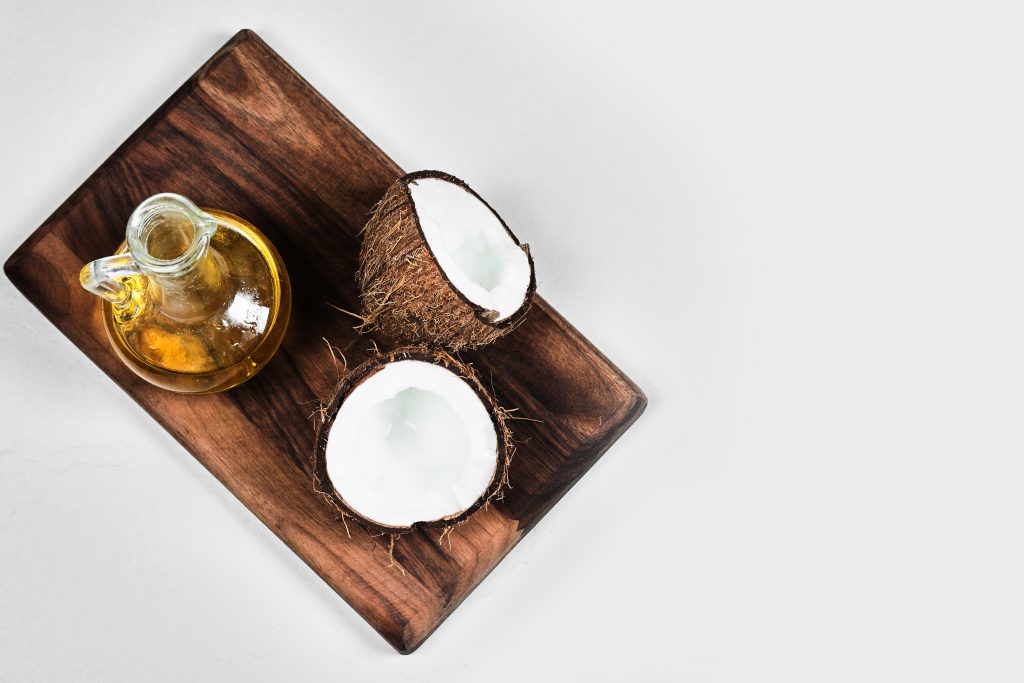
Coconut oil has been very popular for several years. It is widely recommended on social media as a remedy for many health ailments. In the food industry, it has found use as an ingredient in processed foods, a vegan substitute for butter, an ingredient in vegetable pastes or ‘fit’ baked goods and sweets. In many circles, it is regarded as one of the healthiest vegetable fats and is considered a healthier alternative to butter, rapeseed oil or olive oil. Is this right?
Is coconut oil healthy?
Coconut oil consists of more than 90% saturated fatty acids (SFA). Saturated fats, compared to monounsaturated and polyunsaturated fatty acids, are more heat-resistant, which is why coconut fat will work well for frying.
An additional advantage is that it does not contain cholesterol, which can oxidise during the frying process. However, it is worth bearing in mind that both olive oil and rapeseed oil have similar heat stability.
Another advantage that is prescribed to coconut oil is its alleged high content of MCTs (medium-chain fatty acids) with health-promoting properties. MCTs are digested without bile and are absorbed faster than long-chain fatty acids – due to this property, it is believed that MCT oil can slightly increase metabolic rate and promote weight loss.
However, coconut oil contains only 16% MCTs and long-chain fatty acids make up more than 80% of its composition. Therefore, putting MCT oil and coconut oil on an equal footing is incorrect.
Until 2017, according to the dietary standards for the Polish population, saturated fatty acids should not exceed 10% of the energy value of the diet. In the latest 2020 recommendations, this recommendation has been changed. Namely, saturated fatty acids should be at the smallest possible level in a diet that provides adequate nutritional value.
A greater health risk are hydrogenated trans fatty acids (TFAs, trans fatty acids). Their intake should also be as low as possible. TFAs have been shown to contribute to free radicals and insulin resistance, which is a risk factor for type 2 diabetes.
The main sources of trans fats are processed fast food, deep-fried foods, bakery and confectionery products, salty snacks or margarines.
Coconut oil and cholesterol and cardiometabolic health
The American Heart Association (AHA) recommends limiting saturated fat intake and avoiding coconut oil in the daily diet. The health effects of different types of dietary fats have been studied and their contribution to the development of diseases such as diabetes, cardiovascular disease and cancer has been discussed.
A recent report by the American Heart Association estimated that replacing 5% of energy intake with saturated fatty acids (SFAs) with the same intake of polyunsaturated fatty acids (PUFAs) or monounsaturated fatty acids (MUFAs) was associated with a 25 and 15% lower risk of ischaemic heart disease, respectively. In light of this evidence, the latest dietary guidelines for Americans recommend reducing SFAs to less than 10% of daily energy intake and replacing them with unsaturated fats, i.e. olive oil, flax, nuts.
In addition, recent data have shown that these recommendations are associated with preventing weight gain and reducing insulin resistance and diabetes risk. The AHA for people at risk of developing cardiovascular disease recommends limiting saturated fatty acids to 13g per day, and a teaspoon of coconut oil contains as much as 12g of saturated fatty acids.
So is it worth consuming coconut oil?
Research findings on the negative effects of coconut oil on blood cholesterol levels and cardiometabolic health are contradictory.
Additionally, it has no major health-promoting properties compared to other fat sources. Recommendations for the intake of saturated fatty acids are unequivocal: as little as possible in the daily diet.
Studies on coconut oil consumption have not shown clinically significant improvements in lipid profile and body composition compared to other oils. Olive oil consumption is also proven to significantly improve cardiometabolic health.
It therefore remains reasonable not to introduce additional sources of saturated fatty acids and to limit the amount of coconut oil in the daily diet.
Instead of coconut fat, it is advisable to reach for non-tropical vegetable oils, such as olive oil, rich in antioxidant polyphenols and essential fatty acids, which should constitute the main fat pool in the daily diet.
Author: Zuzanna Cybulska, MSc, clinical dietitian